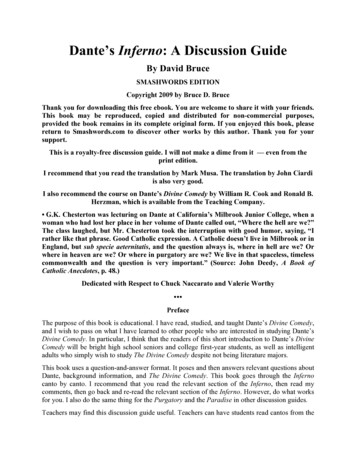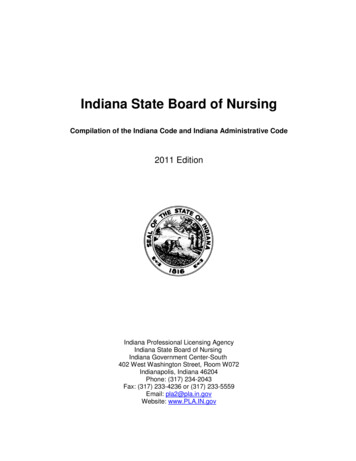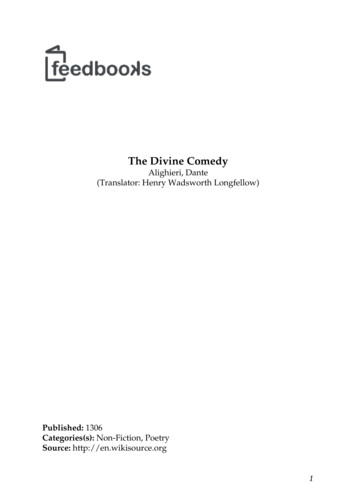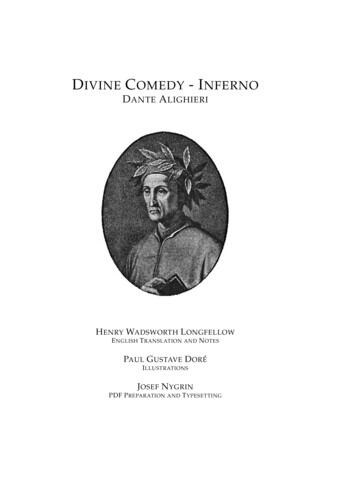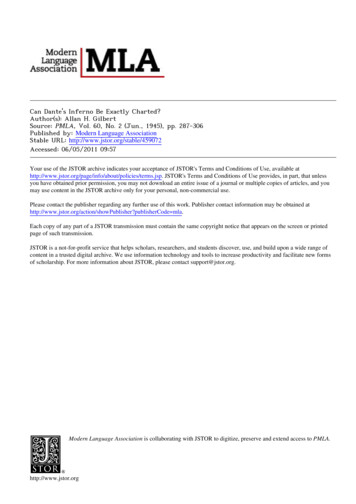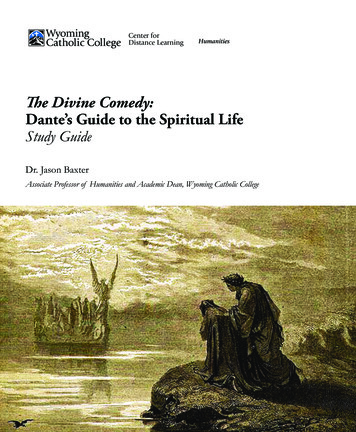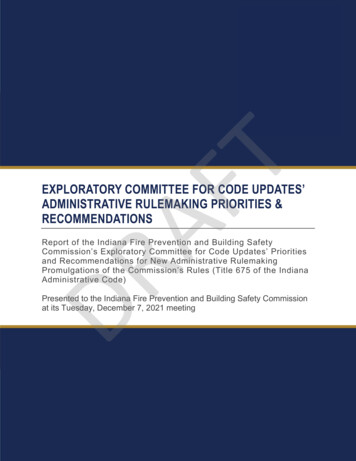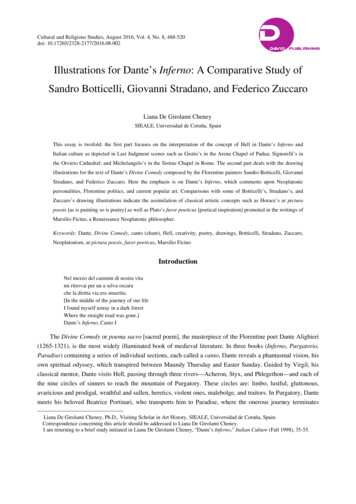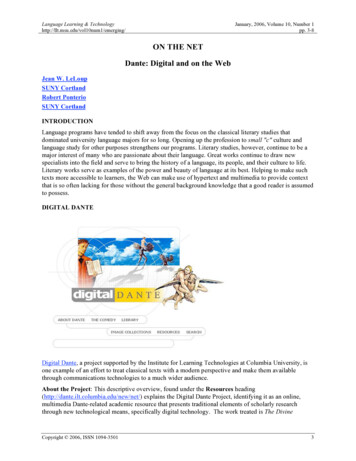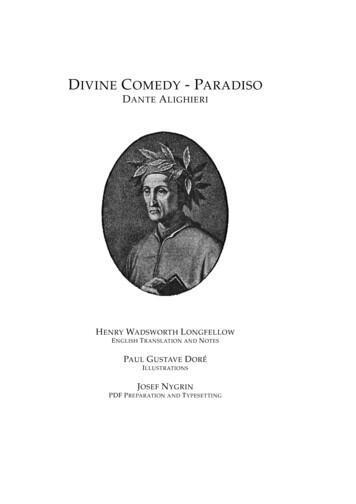
Transcription
D IVINE C OMEDY - PARADISOD ANTE A LIGHIERIH ENRY WADSWORTH L ONGFELLOWE NGLISH T RANSLATION AND N OTESPAUL G USTAVE D OR ÉI LLUSTRATIONSJ OSEF N YGRINPDF P REPARATION AND T YPESETTING
E NGLISH T RANSLATION AND N OTESHenry Wadsworth Longfellow
I LLUSTRATIONSPaul Gustave Doré
Released under Creative Commons Attribution-Noncommercial 3.0/us/You are free:to share – to copy, distribute, display, and perform the work;to remix – to make derivative works.Under the following conditions:attribution – you must attribute the work in the manner specified by the authoror licensor (but not in any way that suggests that they endorse you or your useof the work);noncommercial – you may not use this work for commercial purposes.Any of the above conditions can be waived if you get permission fromthe copyright holder.English translation and notes by H. W. Longfellow obtained s of illustrations by P. G. Doré obtained fromhttp://www.danshort.com/dc/, scanned by Dan Short, used withpermission.M I KT E X LATEX typesetting by Josef Nygrin, in Jan & Feb 2008.http://www.paskvil.com/Some rights reserved c 2008 Josef Nygrin
ContentsCanto 11Canto 27Canto 313Canto 419Canto 525Canto 631Canto 738Canto 843Canto 951Canto 1058Canto 1165Canto 1272Canto 1381Canto 1487Canto 1595Canto 16102Canto 17111
Canto 18117Canto 19125Canto 20133Canto 21140Canto 22148Canto 23155Canto 24160Canto 25166Canto 26172Canto 27179Canto 28187Canto 29195Canto 30201Canto 31206Canto 32213Canto 33219Dante Alighieri225Henry Wadsworth Longfellow231Paul Gustave Doré237Some rights reserved c 2008 Josef Nygrinhttp://www.paskvil.com/
Paradiso
ParadisoCanto 1Tglory of Him who moveth everything 1Doth penetrate the universe, and shineIn one part more and in another less.HEWithin that heaven which most his light receivesWas I, and things beheld which to repeatNor knows, nor can, who from above descends;Because in drawing near to its desire1Dante’s theory of the universe is the old one, which made the earth a stationarycentral point, around which all the heavenly bodies revolved.Speaking of the order of the Ten Heavens, Dante says, Convito, II. 4: “The first is thatwhere the Moon is; the second is that where Mercury is; the third is that where Venus is;the fourth is that where the Sun is; the fifth is that where Mars is; the sixth is that whereJupiter is; the seventh is that where Saturn is; the eighth is that of the Stars; the ninth isnot visible, save by the motion mentioned above, and is called by many the Crystalline –that is, diaphanous, or wholly transparent. Beyohd all these, indeed, the Catholics placethe Empyrean Heaven; that is to say, the Heaven of flame, or luminous; and this theysuppose to be immovable, from having within itself, in every part, that which its matterdemands. And this is the cause why the Primum Mobile has a very swift motion; fromthe fervent longing which each part of that ninth heaven has to be conjoined with thatDivinest Heaven, the Heaven of Rest, which is next to it, it revolves therein with so greatdesire, that its velocity is almost incomprehensible; and quiet and peaceful is the place ofthat supreme Deity, who alone doth perfectly see himself.”These Ten Heavens are the heavens of the Paradiso; nine of them revolving about theearth as a central point, and the motionless Empyrean encircling and containing all.It must be observed, however, that the lower spheres in which the spirits appear, arenot assigned them as their places or dwellings. They show themselves in these differentplaces only to indicate to Dante the different degrees of glory which they enjoy, and toshow that while on earth they were under the influence of the planets in which they hereappear.The threefold main division of the Paradiso, indicated by a longer prelude, or by a naturalpause in the action of the poem, is: –1. From Canto I. to Canto X.2. From Canto X. to Canto XXIII.3. From Canto XXIII. to the end.1
2http://www.paskvil.com/Our intellect ingulphs itself so far,That after it the memory cannot go.Truly whatever of the holy realmI had the power to treasure in my mindShall now become the subject of my song.O good Apollo, for this last empriseMake of me such a vessel of thy powerAs giving the beloved laurel asks!One summit of Parnassus hithertoHas been enough for me, but now with bothI needs must enter the arena left.Enter into my bosom, thou, and breatheAs at the time when Marsyas thou didst drawOut of the scabbard of those limbs of his.O power divine, lend’st thou thyself to meSo that the shadow of the blessed realmStamped in my brain I can make manifest,Thou’lt see me come unto thy darling tree,And crown myself thereafter with those leavesOf which the theme and thou shall make me worthy.So seldom, Father, do we gather themFor triumph or of Caesar or of Poet,(The fault and shame of human inclinations,)That the Peneian foliage should bring forthJoy to the joyous Delphic deity,When any one it makes to thirst for it.A little spark is followed by great flame;Perchance with better voices after meShall prayer be made that Cyrrha may respond!2To mortal men by passages diverseUprises the world’s lamp; but by that oneWhich circles four uniteth with three crosses, 3With better course and with a better starConjoined it issues, and the mundane wax 42A town at the foot of Parnassus, dedicated to Apollo, and here used for Apollo.That point of the horizon where the sun rises at the equinox; and where the Equator,the Zodiac, and the equinoctial Colure meet, and form each a cross with the Horizon.4The world is as wax, which the sun softens and stamps with his seal.3
Dante Alighieri - Divine Comedy, Paradiso3Tempers and stamps more after its own fashion.Almost that passage had made morning there 5And evening here, and there was wholly whiteThat hemisphere, and black the other part,When Beatrice towards the left-hand sideI saw turned round, and gazing at the sun;Never did eagle fasten so upon it!And even as a second ray is wontTo issue from the first and reascend,Like to a pilgrim who would fain return,Thus of her action, through the eyes infusedIn my imagination, mine I made,And sunward fixed mine eyes beyond our wont.There much is lawful which is here unlawfulUnto our powers, by virtue of the placeMade for the human species as its own.Not long I bore it, nor so little whileBut I beheld it sparkle round aboutLike iron that comes molten from the fire;And suddenly it seemed that day to dayWas added, as if He who has the powerHad with another sun the heaven adorned.With eyes upon the everlasting wheelsStood Beatrice all intent, and I, on herFixing my vision from above removed,Such at her aspect inwardly becameAs Glaucus, tasting of the herb that made him 6Peer of the other gods beneath the sea.To represent transhumanise in wordsImpossible were; the example, then, sufficeHim for whom Grace the experience reserves.5“This word almost,” says Buti, “gives us to understand that it was not the exact moment when the sun enters Aries.”6Glaucus, changed to a sea-god by eating of the salt-meadow grass.“As Glaucus,” says Buti, “was changed from a fisherman to a sea-god by tasting of thegrass that had that power, so the human soul, tasting of things divine, becomes divine.”
4http://www.paskvil.com/If I was merely what of me thou newly 7Createdst, Love who governest the heaven,Thou knowest, who didst lift me with thy light!When now the wheel, which thou dost make eternal 8Desiring thee, made me attentive to itBy harmony thou dost modulate and measure, 9Then seemed to me so much of heaven enkindledBy the sun’s flame, that neither rain nor riverE’er made a lake so widely spread abroad.The newness of the sound and the great lightKindled in me a longing for their cause,Never before with such acuteness felt;Whence she, who saw me as I saw myself,To quiet in me my perturbed mind,Opened her mouth, ere I did mine to ask,And she began: “Thou makest thyself so dullWith false imagining, that thou seest notWhat thou wouldst see if thou hadst shaken itThou art not upon earth, as thou believest;But lightning, fleeing its appropriate site, 10Ne’er ran as thou, who thitherward returnest.”If of my former doubt I was divestedBy these brief little words more smiled than spoken,I in a new one was the more ensnared;And said: “Already did I rest contentFrom great amazement; but am now amazedIn what way I transcend these bodies light.”7Whether I were spirit only. One of the questions which exercised the minds of theFathers and the Schoolmen was, whether the soul were created before the body or afterit. Origen, following Plato, supposes all souls to have been created at once, and to awaittheir bodies. Thomas Aquinas combats this opinion, Sum. Theol., I. Quaest. CXVIII. 3,and maintains, that “creation and infusion are simultaneous in regard to the soul.” Thisseems also to be Dante’s belief.8It is a doctrine of Plato that the heavens are always in motion, seeking the Soul of theWorld, which has no determinate place; but is everywhere diffused.9The music of the spheres.10The region of fire. Brunetto Latini, Tresor, Ch. CVIII.: “After the zone of the air isplaced the fourth element. This is an orb of fire without any moisture, which extends asfar as the moon, and surrounds this atmosphere in which we are. And know that abovethe fire is first the moon, and the other stars, which are all of the nature of fire.”
5Dante Alighieri - Divine Comedy, ParadisoWhereupon she, after a pitying sigh,Her eyes directed tow’rds me with that lookA mother casts on a delirious child;And she began: “All things whate’er they beHave order among themselves, and this is form,That makes the universe resemble God.Here do the higher creatures see the footprintsOf the Eternal Power, which is the endWhereto is made the law already mentioned.In the order that I speak of are inclinedAll natures, by their destinies diverse,More or less near unto their origin;Hence they move onward unto ports diverseO’er the great sea of being; and each oneWith instinct given it which bears it on.This bears away the fire towards the moon;This is in mortal hearts the motive powerThis binds together and unites the earth.Nor only the created things that areWithout intelligence this bow shoots forth,But those that have both intellect and love.The Providence that regulates all thisMakes with its light the heaven forever quiet,Wherein that turns which has the greatest haste.11And thither now, as to a site decreed,Bears us away the virtue of that cordWhich aims its arrows at a joyous mark.True is it, that as oftentimes the formAccords not with the intention of the art,Because in answering is matter deaf,So likewise from this course doth deviateSometimes the creature, who the power possesses,Though thus impelled, to swerve some other way,(In the same wise as one may see the fireFall from a cloud,) if the first impetus11The Empyrean, within which the Primum Mobile revolves “with so great desire thatits velocity is almost incomprehensible.”
6http://www.paskvil.com/Earthward is wrested by some false delight.Thou shouldst not wonder more, if well I judge,At thine ascent, than at a rivuletFrom some high mount descending to the lowland.Marvel it would be in thee, if deprivedOf hindrance, thou wert seated down below,As if on earth the living fire were quiet.” 12Thereat she heavenward turned again her face.12Convito, 111. 2: “The human soul, ennobled by the highest power, at is by reason,partakes of the divine nature in the manner of an eternal Intelligence; because the soulis so ennobled by that sovereign power, and denuded of matter; that the divine lightshines in it as in an angel; and therefore man has been called by the philosophers a divineanimal.”
ParadisoCanto 2Owho in some pretty little boat, 13Eager to listen, have been followingBehind my ship, that singing sails along,YE ,Turn back to look again upon your shores;Do not put out to sea, lest peradventure,In losing me, you might yourselves be lost.The sea I sail has never yet been passed;Minerva breathes, and pilots me Apollo, 14And Muses nine point out to me the Bears.Ye other few who have the neck upliftedBetimes to th’ bread of Angels upon which 1513The Heaven of the Moon, in which are seen the spirits of those who, having takenmonastic vows, were forced to violate them.In Dante’s symbolism this heaven represents the first science of the Trivium. Convito, II.14: “I say that the heaven of the Moon resembles Grammar; because it may be comparedtherewith; for if the Moon be well observed, two things are seen peculiar to it, which arenot seen in the other stars. One is the shadow in it, which is nothing but the rarity of itsbody, in which the rays of the sun cannot terminate and be reflected as in the other parts.The other is the variation of its brightness, which now shines on one side, and now uponthe other, according as the sun looks upon it. And Grammar has these two properties;since, on account of its infinity, the rays of reason do not terminate in it in any specialpart of its words; and it shines now on this side, and now on that, inasmuch as certainwords, certain declinations, certain constructions, are in use which once were not, andmany once were which will be again.”For the influences of the Moon, see Canto III. Note 30.The introduction to this canto is at once a warning and an invitation.14In the other parts of the poem “one summit of Parnassus” has sufficed; but in thisMinerva, Apollo, and the nine Muses come to his aid, as wind, helmsman, and compass.15The bread of the Angels is Knowledge or Science, which Dante calls the “ultimateperfection.” Convito, I. 1: “Everything, impelled by the providence of its own nature,inclines towards its own perfection; whence, inasmuch as knowledge is the ultimate perfection of our soul, wherein consists our ultimate felicity, we are all naturally subject toits desire. . O blessed those few who sit at the table where the bread of the Angels is7
8http://www.paskvil.com/One liveth here and grows not sated by it,Well may you launch upon the deep salt-seaYour vessel, keeping still my wake before youUpon the water that grows smooth again.Those glorious ones who unto Colchos passed 16Were not so wonder-struck as you shall be,When Jason they beheld a ploughman made!The con-created and perpetual thirst 17For the realm deiform did bear us on,As swift almost as ye the heavens behold.Upward gazed Beatrice, and I at her;And in such space perchance as strikes a bolt 18And flies, and from the notch unlocks itself,Arrived I saw me where a wondrous thingDrew to itself my sight; and therefore sheFrom whom no care of mine could be concealed,Towards me turning, blithe as beautiful,Said unto me: “Fix gratefully thy mindOn God, who unto the first star has brought us.”It seemed to me a cloud encompassed us,Luminous, dense, consolidate and brightAs adamant on which the sun is striking.Into itself did the eternal pearlReceive us, even as water doth receiveA ray of light, remaining still unbroken.eaten.”16The Argonauts, when they saw their leader Jason ploughing with the wild bulls ofAeetes, and sowing the land with serpents’ teeth.17This is generally interpreted as referring to the natural aspiration of the soul forhigher things; characterized in Purgatorio XXI. 1, as“The natural thirst that ne’er is satisfied,Excepting with the water for whose graceThe woman of Samaria besought.”But Venturi says that it means the “being borne onward by the motion of the PrimumMobile, and swept round so as to find himself directly beneath the moon.”18As if looking back upon his journey through the air, Dante thus rapidly describes itan inverse order, the arrival, the ascent, the departure; the striking of the shaft, the flight,the discharge from the bow-string. Here again we are reminded of the arrow of Pandarus,Iliad, IV. 120.
Dante Alighieri - Divine Comedy, Paradiso9If I was body, (and we here conceive notHow one dimension tolerates another,Which needs must be if body enter body,)More the desire should be enkindled in usThat essence to behold, wherein is seenHow God and our own nature were united.There will be seen what we receive by faith,Not demonstrated, but self-evidentIn guise of the first truth that man believes.I made reply: “Madonna, as devoutlyAs most I can do I give thanks to HimWho has removed me from the mortal world.But tell me what the dusky spots may beUpon this body, which below on earthMake people tell that fabulous tale of Cain?” 19Somewhat she smiled; and then, “If the opinionOf mortals be erroneous,” she said,“Where’er the key of sense doth not unlock,Certes, the shafts of wonder should not pierce theeNow, forasmuch as, following the senses,Thou seest that the reason has short wings.But tell me what thou think’st of it thyself.”And I: “What seems to us up here diverse, 20Is caused, I think, by bodies rare and dense.”And she: “Right truly shalt thou see immersedIn error thy belief, if well thou hearestThe argument that I shall make against it.Lights many the eighth sphere displays to you 21Which in their quality and quantityMay noted be of aspects different.If this were caused by rare and dense alone,One only virtue would there be in all19Cain with his bush of thorns.The spots in the Moon, which Dante thought were caused by rarity of density of thesubstance of the planet. Convito, II. 14: “The shadow in it, which is nothing but the rarityof its body, in which the rays of the sun cannot terminate and be reflected, as in the otherparts.”21The Heaven of the Fixed Stars.20
10http://www.paskvil.com/Or more or less diffused, or equally.Virtues diverse must be perforce the fruitsOf formal principles; and these, save one,Of course would by thy reasoning be destroyed.Besides, if rarity were of this dimness 22The cause thou askest, either through and throughThis planet thus attenuate were of matter,Or else, as in a body is apportionedThe fat and lean, so in like manner thisWould in its volume interchange the leaves.Were it the former, in the sun’s eclipseIt would be manifest by the shining through,Of light, as through aught tenuous interfused.This is not so; hence we must scan the other,And if it chance the other I demolish,Then falsified will thy opinion be.But if this rarity go not through and through,There needs must be a limit, beyond whichIts contrary prevents the further passing,And thence the foreign radiance is reflected,Even as a colour cometh back from glass,The which behind itself concealeth lead. 23Now thou wilt say the sunbeam shows itselfMore dimly there than in the other parts,By being there reflected farther back.From this reply experiment will free theeIf e’er thou try it, which is wont to beThe fountain to the rivers of your arts.Three mirrors shalt thou take, and two removeAlike from thee, the other more remoteBetween the former two shall meet thine eyes.Turned towards these, cause that behind thy backBe placed a light, illuming the three mirrors22Either the diaphanous parts must run through the body of the Moon, or the rarityand density must be in layers one above the other.23As in a mirror, which Dante elsewhere – Inferno XXIII 25 – calls impiombato vetro –leaded glass.
11Dante Alighieri - Divine Comedy, ParadisoAnd coming back to thee by all reflected.Though in its quantity be not so ampleThe image most remote, there shalt thou seeHow it perforce is equally resplendent.Now, as beneath the touches of warm raysNaked the subject of the snow remains 24Both of its former colour and its cold,Thee thus remaining in thy intellect,Will I inform with such a living light,That it shall tremble in its aspect to thee.25Within the heaven of the divine repose 26Revolves a body, in whose virtue liesThe being of whatever it contains.The following heaven, that has so many eyes, 27Divides this being by essences diverse,Distinguished from it, and by it contained.The other spheres, by various differences,All the distinctions which they have within themDispose unto their ends and their effects.Thus do these organs of the world proceed,As thou perceivest now, from grade to gradeSince from above they take, and act beneathObserve me well, how through this place I comeUnto the truth thou wishest, that hereafterThou mayst alone know how to keep the fordThe power and motion of the holy spheres,As from the artisan the hammer’s craft,Forth from the blessed motors must proceed.24The subject of the snow is what lies under it; “the mountain that remains naked,”says Buti. Others give a scholastic interpretation to the word, defining it “the cause ofaccident,” the cause of colour and cold.25Shall tremble like a star. “When a man looks at the stars,” says Buti, “he sees theireffulgence tremble, and this is because their splendour scintillates as fire does, and movesto and fro like the flame of the fire.” The brighter they burn, the more they tremble.26The Primum Mobile, revolving in the Empyrean, and giving motion to all the heavensbeneath it.27The Heaven of the Fixed Stars. Greek Epigrams, III. 62: – “If I were heaven, with allthe eyes of heaven would I look down on thee.”
12http://www.paskvil.com/The heaven, which lights so manifold make fair,From the Intelligence profound, which turns it. 28The image takes, and makes of it a seal.And even as the soul within your dustThrough members different and accommodatedTo faculties diverse expands itself,So likewise this Intelligence diffusesIts virtue multiplied among the stars.Itself revolving on its unity.Virtue diverse doth a diverse alloyageMake with the precious body that it quickens,In which, as life in you, it is combined.From the glad nature whence it is derived,The mingled virtue through the body shines,Even as gladness through the living pupil.From this proceeds whate’er from light to lightAppeareth different, not from dense and rare:This is the formal principle that produces, 29According to its goodness, dark and bright.”28The Intelligences, ruling and guiding the several heavens (receiving power fromabove, and distributing it downward, taking their impression from God and stampingit like a seal upon the spheres below), according to Dionysius the Areopagite are asfollows:– The Seraphim – Primum Mobile, The Cherubim – The Fixed Stars, The Thrones– Saturn, The Dominions – Jupiter, The Virtues – Mars, The Powers – The Sun, The Principalities – Venus, The Archangels – Mercury, The Angels – The Moon.29The principle which gives being to all created things.
ParadisoCanto 3TSun, which erst with love my bosom warmed, 30Of beauteous truth had unto me discovered,By proving and reproving, the sweet aspect.HATAnd, that I might confess myself convincedAnd confident, so far as was befitting,I lifted more erect my head to speak.But there appeared a vision, which withdrew meSo close to it, in order to be seen,That my confession I remembered not.Such as through polished and transparent glass,Or waters crystalline and undisturbed,But not so deep as that their bed be lost,Come back again the outlines of our facesSo feeble, that a pearl on forehead whiteComes not less speedily unto our eyes;Such saw I many faces prompt to speak,30The Heaven of the Moon continued. Of the influence of this planet, Buti, quotingthe astrologer Albumasar, says: “The Moon is cold, moist, and phlegmatic, sometimeswarm, and gives lightness, aptitude in all things, desire of joy, of beauty, and of praise,beginning of all works, knowledge of the rich and noble, prosperity in life, acquisition ofthings desired, devotion in faith, superior sciences, multitude of thoughts, necromancy,acuteness of mind in things, geometry, knowledge of lands and waters and of their measure and number, weakness of the sentiments, noble women, marriages, pregnancies,nursings, embassies, falsehoods, accusations; the being lord among lords, servant amongservants, and conformity with every man of like nature, oblivion thereof, timid, of simpleheart, flattering, honourable towards men, useful to them, not betraying secrets, a multitude of infirmities and the care of healing bodies, cutting hair, liberality of food, chastity.These are the significations (influences) of the Moon upon the things it finds, the blameand honour of which, according to the astrologers, belong to the planet; but the wise manfollows the good influences, and leaves the bad; though all are good and necessary to thelife of the universe.”13
14http://www.paskvil.com/So that I ran in error oppositeTo that which kindled love ’twixt man and fountain.31As soon as I became aware of them,Esteeming them as mirrored semblances,To see of whom they were, mine eyes I turned,And nothing saw, and once more turned them forwardDirect into the light of my sweet Guide,Who smiling kindled in her holy eyes.“Marvel thou not,” she said to me, “becauseI smile at this thy puerile conceit,Since on the truth it trusts not yet its foot,But turns thee, as ’tis wont, on emptiness.True substances are these which thou beholdest,Here relegate for breaking of some vow.Therefore speak with them, listen and believe;For the true light, which giveth peace to them,Permits them not to turn from it their feet.”And I unto the shade that seemed most wishfulTo speak directed me, and I began,As one whom too great eagerness bewilders:“O well-created spirit, who in the raysOf life eternal dost the sweetness tasteWhich being untasted ne’er is comprehended.Grateful ’twill be to me, if thou content me 32Both with thy name and with your destiny.”Whereat she promptly and with laughing eyes:“Our charity doth never shut the doorsAgainst a just desire, except as oneWho wills that all her court be like herself.I was a virgin sister in the world;And if thy mind doth contemplate me well,The being more fair will not conceal me from thee,31Narcissus mistook his shadow for a substance; Dante, falling into the opposite error,mistakes these substances for shadows.32Your destiny; that is, of yourself and the others with you.
Dante Alighieri - Divine Comedy, Paradiso15But thou shalt recognise I am Piccarda, 33Who, stationed here among these other blessed,Myself am blessed in the slowest sphere.All our affections, that alone inflamedAre in the pleasure of the Holy Ghost,Rejoice at being of his order formed;And this allotment, which appears so low,Therefore is given us, because our vowsHave been neglected and in some part void.”Whence I to her: “In your miraculous aspectsThere shines I know not what of the divine,Which doth transform you from our first conceptions.Therefore I was not swift in my remembrance;But what thou tellest me now aids me so,That the refiguring is easier to me.But tell me, ye who in this place are happy,Are you desirous of a higher place,To see more or to make yourselves more friends?”First with those other shades she smiled a little;Thereafter answered me so full of gladness,She seemed to burn in the first fire of love:“Brother, our will is quieted by virtueOf charity, that makes us wish aloneFor what we have, nor gives us thirst for more.If to be more exalted we aspired,Discordant would our aspirations beUnto the will of Him who here secludes us;Which thou shalt see finds no place in these circles,If being in charity is needful here,And if thou lookest well into its nature;Nay, ’tis essential to this blest existenceTo keep itself within the will divine,33Piccarda was a sister of Forese and Corso Donati, and of Gemma, Dante’s wife. Shewas a nun of Santa Clara, and was dragged by violence from the cloister by her brotherCorso Donati, who married her to Rosselin della Tosa. As she herself says: – “God knowswhat afterward my life became.” It was such that she did not live long. For this crime the“excellent Baron,” according to the Ottimo, had to do penance in his shirt.
16http://www.paskvil.com/Whereby our very wishes are made one;So that, as we are station above stationThroughout this realm, to all the realm ’tis pleasing,As to the King, who makes his will our will.And his will is our peace; this is the seaTo which is moving onward whatsoeverIt doth create, and all that nature makes.”Then it was clear to me how everywhereIn heaven is Paradise, although the graceOf good supreme there rain not in one measureBut as it comes to pass, if one food sates,And for another still remains the longing,We ask for this, and that decline with thanks,E’en thus did I; with gesture and with word,To learn from her what was the web whereinShe did not ply the shuttle to the end.“A perfect life and merit high in-heavenA lady o’er us,” said she, “by whose ruleDown in your world they vest and veil themselves,That until death they may both watch and sleepBeside that Spouse who every vow acceptsWhich charity conformeth to his pleasure.To follow her, in girlhood from the worldI fled, and in her habit shut myself,And pledged me to the pathway of her sect.Then men accustomed unto evil moreThan unto good, from the sweet cloister tore me;God knows what afterward my life became.This other splendour, which to thee revealsItself on my right side, and is enkindledWith all the illumination of our sphere,What of myself I say applies to her;A nun was she, and likewise from her headWas ta’en the shadow of the sacred wimple.But when she too was to the world returnedAgainst her wishes and against good usage,Of the heart’s veil she never was divested.
Dante Alighieri - Divine Comedy, Paradiso17Of great Costanza this is the effulgence, 34Who from the second wind of SuabiaBrought forth the third and latest puissance.”Thus unto me she spake, and then began“Ave Maria” singing, and in singingVanished, as through deep water something heavy.My sight, that followed her as long a timeAs it was possible, when it had lost herTurned round unto the mark of more desire,And wholly unto Beatrice reverted;But she such lightnings flashed into mine eyes,That at the first my sight endured it not
seems also to be Dante's belief. 8It is a doctrine of Plato that the heavens are always in motion, seeking the Soul of the World, which has no determinate place; but is everywhere diffused. 9The music of the spheres. 10The region of fire. Brunetto Latini, Tresor, Ch. CVIII.: "After the zone of the air is placed the fourth element.
